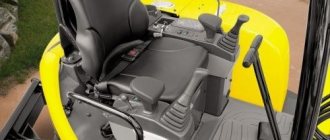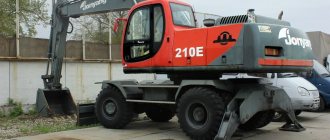Author: ProfGid
An excavator operator is a person who operates earth-moving machines. He spends most of his time in a sitting position, the working conditions are difficult, but the work is highly paid. By the way, in 2022, the ProfGid career guidance center developed an accurate career guidance test. He himself will tell you which professions are suitable for you, and give an opinion about your personality type and intelligence.
Short description
Most often, men work as excavator operators. Their main responsibility is the development of different types of soils necessary to solve the following problems:
- arrangement of excavations and embankments;
- construction of transport and railway connections;
- creation of irrigation canals;
- creation of shipping canals, dams;
- civil Engineering;
- arrangement of trenches for communications and other similar structures.
While performing work, the excavator operator loads and unloads the bucket, turns the boom, and also directly controls the special equipment. He must also be able to carry out minor routine repairs of the vehicle on site, refuel if necessary, and prevent premature wear of the structural elements of the excavator.
To work in this area, you must obtain a license with a category (the main ones are B, C, D, E), which gives you the opportunity to drive special equipment with different productivity and bucket volumes (the higher the category, the more powerful the vehicle). The excavator operator must undergo a medical examination before starting training. People with mental, vision, or vestibular problems may not be allowed to work.
Occupational ranks of excavator operator
Depending on the type of equipment, the following categories can be distinguished: fourth, fifth, sixth, seventh and eighth.
Excavator operator 4th category
Operates a single-bucket excavator, which has a bucket with a capacity of up to 0.4 m3.
Excavator operator 5th category
It can already work with three types of equipment: a single-bucket excavator, where the bucket capacity does not exceed 2.5 m3, a straight shovel excavator with a capacity of less than 2 m3, and a multi-bucket excavator.
Excavator operator 6th category
Has the right to operate both more powerful analogues of the above models, as well as a multi-bucket excavator, which is necessary for selective excavation of layers of rock mass, a drum homogenizing and loading machine, and a stacking and picking machine.
Excavator operator 7th category
Qualified to operate a single-bucket excavator with a capacity of 4.6 to 10.0 m3, a long-range excavator with a capacity greater than 4 m3, and multi-bucket excavators with a capacity of 2500 to 4500 m3/hour.
Excavator operator 8th category
Can be used to control a single-bucket excavator, the capacity of which exceeds 10 m3, multi-bucket chain or rotary excavators.
Advantages and disadvantages
pros
- Decent pay, bonuses possible for extracurricular work.
- You can quickly master the profession by completing 11th grade.
- Continuous professional development, resulting in dynamic salary growth.
- The schedule is most often standardized.
- Excavator operators are in demand in any region of the Russian Federation.
- Earthmoving machines operate in both winter and summer, so the operator will always have work to do.
Minuses
- Working conditions can hardly be called simple. The work is sedentary; the excavator cabin provides little protection from the scorching sun or frost.
- High risk of injury at work.
- By the age of 40, occupational diseases may develop, such as vibration disease, problems with the nervous system, hearing loss, and bronchial asthma.
Features of the profession
It is not difficult to guess that the excavator driver controls the earthmoving equipment. But his responsibilities do not end there. Periodic maintenance and minor repairs, provided that the excavator is not under manufacturer's warranty, are also the responsibility of the operator. It is important to understand that working with heavy construction equipment involves high risks and great responsibility. An excavator operator has no right to make mistakes; he must remember safety rules perfectly, be able to visually determine the distances between objects with high accuracy and have a good reaction. This work is intended for people with a stable psyche, since in any emergency situation the severity of the consequences largely depends on how quickly the excavator operator has time to react. A graduate of a secondary specialized institution will have to start his career with the position of “assistant excavator driver.” Such an internship is simply necessary: even if a student has studied diligently, he still has to learn a lot about technology and the peculiarities of work in practice.
Experience: how to describe it
The applicant must show what he did in previous jobs so that the employer understands how well this meets the stated requirements.
Sample of how to fill out work experience for a backhoe loader operator resume :
EXPERIENCE
- Period:
October 2016 – present - Organization:
LLC STC "SPETSBETON"
- Job title:
Excavator driver:
- Responsibilities:
— excavator control; — fuel and lubricant refueling; — Excavator maintenance; — identifying and eliminating machine malfunctions; — loading operations; — planning of slopes of the subgrade; — filling out travel documents and forms.
Achievements are something you can be proud of. Surely you have had to write reports. Digital indicators from such documents can be a good illustration of your professionalism.
Sample description of achievements for 2 years:
ACHIEVEMENTS
- Achievements (over 2 years):
- completed more than 3000 flights; — increased soil production by 20%; — repaired hydraulic cylinders in three cars.
What licenses are needed for an excavator?
For special equipment on tracks or wheels, special categories of rights have been developed:
- B - gives permission to operate small tracked vehicles with a power of up to 25.7 kW;
- C - for specialized wheeled vehicles with power up to 110.3 kW;
- D - suitable for controlling powerful wheeled special equipment (over 110.3 kW);
- E - for controlling powerful tracked vehicles (more than 25.7 kW);
- F - designed to control special-purpose agricultural machinery.
To obtain an excavator operator’s license for a particular model, you need to compare the category and power of the machine you will be working on.
Many enterprises in the construction, public utilities or agricultural sectors willingly employ drivers who have only one special category. But those companies that strive to achieve greater operational efficiency are willing to accommodate those who want to study to become excavator operators. A competent employer understands that the interchangeability of specialists is the key to stable work.
Those who want to study and receive an additional category should take into account that when transferring from one type of machine to another, the training will take place within the framework of an additional shortened program. Certification will be required.
If the enterprise plans to transfer the driver from one model of excavator to another of the same type, then no additional training is required. In such a situation, the excavator operator must familiarize himself with the features of the proposed special equipment, undergo an internship for 5-8 shifts, and only after that begin independent work.
Knowledge that an excavator operator must have
A modern tractor and excavator driver must be fluent in all types of loading and unloading equipment. And if he has gaps in knowledge and skills related to any unit, he needs to learn at a training center and raise his level to a new level.
A number of fundamental issues that an excavator operator should know:
- design and technical data of the excavator;
- features of the operation of technological equipment: mechanical, electrical and hydraulic;
- basic provisions for conducting mining operations;
- purpose and principle of operation of measuring instruments and devices;
- technology of work related to laying main pipes;
- methods for developing various categories of soils;
- types of parts and components that wear out and become unusable most quickly, the sequence and methods of replacing them;
- causes of problems and methods for preventing them;
- rules for transporting an excavator.
If an excavator driver was able to successfully train as a specialist who has the seventh or eighth category, he can switch to a loader without any problems.
Standard job description form for excavator operator
What are skills and how to write about them
Skills are what you can do.
They are used to assess the candidate’s professional training, so pay special attention to this section. The skills measured indicate the level. It can range from beginner to professional. Don't know what to write? The vacancy text always lists the skills that an employee must have, so you don’t have to search for suitable areas for a long time. Key skills in an excavator operator resume:
| Loading and unloading | Quarrying |
| Traffic rules | Attachments |
| Travel documentation | Excavator repair; |
| Snow removal | Mulching |
| KOMATSU equipment | JCB machines |
| Full rotation excavators | Tracked vehicles |
In a separate block you can indicate your level of foreign language proficiency.
What documents does a driver need to have with him?
Every driver of self-propelled vehicles should know what documents they must have in order to avoid problems when checking them at work. First of all, this:
- Certificate of required category and unloading.
- Vehicle registration.
- A certificate confirming ownership or a power of attorney to use a special machine is required.
- Experienced drivers do not forget about a travel card, a coupon for the right to use and an insurance policy.
An employee may be allowed to operate an excavator only after receiving a medical commission.
Other documents:
- The candidate must submit to the training organization a medical certificate of form 003-B/a about the new sample, a passport of a citizen of the Russian Federation, a document, several photographs measuring 3x4 cm (the number must be indicated in the educational institution).
- To pass the exam at Gostekhnadzor, a certificate confirming completion of the course is required. It may not be available if the candidate prepared for the certification on his own. Additionally, you must fill out a driver's card - the form is issued before the exam.
What documents are needed to operate a tractor or excavator: license, OSAGO policy, travel document, registration certificate.
Work on lifting equipment and towers must be performed by trained specialists. The owner entrusts this vehicle to the excavator driver who has an excavator license and extensive experience. An internship is often required after training. And after that you can start working.









